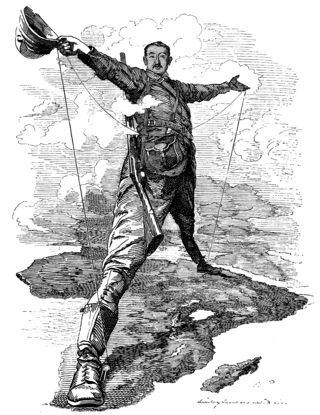The East Indies are the lands of South (Indian subcontinent) and Southeast Asia.
East Indies may also refer to:
- Patriarchate of the East Indies, a Roman Catholic Church geographic division
- East Indie, a domestic ornamental breed of duck
The East Indies are the lands of South (Indian subcontinent) and Southeast Asia.
East Indies may also refer to:
Indian or Indians may refer to:

The influence and imperialism of Western Europe and associated states peaked in Asian territories from the colonial period beginning in the 16th century and substantially reducing with 20th century decolonization. It originated in the 15th-century search for trade routes to the Indian subcontinent and Southeast Asia that led directly to the Age of Discovery, and additionally the introduction of early modern warfare into what Europeans first called the East Indies and later the Far East. By the early 16th century, the Age of Sail greatly expanded Western European influence and development of the spice trade under colonialism. European-style colonial empires and imperialism operated in Asia throughout six centuries of colonialism, formally ending with the independence of the Portuguese Empire's last colony Macau in 1999. The empires introduced Western concepts of nation and the multinational state. This article attempts to outline the consequent development of the Western concept of the nation state.

The United East India Company was a chartered company established on 20 March 1602 by the States General of the Netherlands amalgamating existing companies into the first joint-stock company in the world, granting it a 21-year monopoly to carry out trade activities in Asia. Shares in the company could be bought by any resident of the United Provinces and then subsequently bought and sold in open-air secondary markets. It is sometimes considered to have been the first multinational corporation. It was a powerful company, possessing quasi-governmental powers, including the ability to wage war, imprison and execute convicts, negotiate treaties, strike its own coins, and establish colonies.

The East Indies is a term used in historical narratives of the Age of Discovery. The Indies refers to various lands in the East or the Eastern hemisphere, particularly the islands and mainlands found in and around the Indian Ocean by Portuguese explorers, soon after the Cape route was discovered. Nowadays, this term is broadly used to refer to the Malay Archipelago, which today comprises the Philippine Archipelago, Indonesian Archipelago, Borneo, and New Guinea. Historically, the term was used in the Age of Discovery to refer to the coasts of the landmasses comprising the Indian subcontinent and the Indochinese Peninsula along with the Malay Archipelago.
Nis, Niš, NiS or NIS may refer to:
East India is a region of India consisting of the states of West Bengal, Bihar, Jharkhand, and Odisha.

Colonial India was the part of the Indian subcontinent that was occupied by European colonial powers during the Age of Discovery. European power was exerted both by conquest and trade, especially in spices. The search for the wealth and prosperity of India led to the colonisation of the Americas after Christopher Columbus went to the Americas in 1492. Only a few years later, near the end of the 15th century, Portuguese sailor Vasco da Gama became the first European to re-establish direct trade links with India by being the first to arrive by circumnavigating Africa. Having arrived in Calicut, which by then was one of the major trading ports of the eastern world, he obtained permission to trade in the city from the Saamoothiri Rajah. The next to arrive were the Dutch, with their main base in Ceylon. Their expansion into India was halted after their defeat in the Battle of Colachel to the Kingdom of Travancore, during the Travancore–Dutch War.

The South-East Asian Theatre of World War II consisted of the campaigns of the Pacific War in the Philippines, Thailand, Indonesia, Indochina, Burma, India, Malaya and Singapore between 1941 and 1945.

The Dutch colonial empire comprised the overseas territories and trading posts controlled and administered by Dutch chartered companies—mainly the Dutch East India Company and the Dutch West India Company—and subsequently by the Dutch Republic (1581–1795), and by the modern Kingdom of the Netherlands after 1815. It was initially a trade-based system which derived most of its influence from merchant enterprise and from Dutch control of international maritime shipping routes through strategically placed outposts, rather than from expansive territorial ventures. The Dutch were among the earliest empire-builders of Europe, following Spain and Portugal and one of the wealthiest nations of that time.
Batavia may refer to:
A colonial empire is a collective of territories, either contiguous with the imperial center or located overseas, settled by the population of a certain state and governed by that state.

The West Indies is a subregion of North America, surrounded by the North Atlantic Ocean and the Caribbean Sea, which comprises 13 independent island countries and 18 dependencies in three archipelagos: the Greater Antilles, the Lesser Antilles, and the Lucayan Archipelago.

The South West Pacific theatre, during World War II, was a major theatre of the war between the Allies and the Axis. It included the Philippines, the Dutch East Indies, Borneo, Australia and its mandate Territory of New Guinea and the western part of the Solomon Islands. This area was defined by the Allied powers' South West Pacific Area (SWPA) command.
Singapore is an island city-state in Southeast Asia.
The East Indies, or Indies for short, is used to describe the lands of South and Southeast Asia.

The Eastern Fleet, later called the East Indies Fleet, was a fleet of the Royal Navy which existed between 1941 and 1952.
East India Company is a general term, referring to a number of European trading companies established in the early modern era to establish trade relations and subsequently political control over the Indian subcontinent, the Indonesian archipelago and the neighboring lands in Southeast Asia. They would include:

The East Indies theatre of the French Revolutionary Wars was a series of campaigns related to the major European conflict known as the French Revolutionary Wars, fought between 1793 and 1801 between the new French Republic and its allies and a shifting alliance of rival powers. Although the Indian Ocean was separated by vast distance from the principal theatre of the conflict in Western Europe, it played a significant role due to the economic importance of the region to Great Britain, France's most constant opponent, of its colonies in India and the Far Eastern trade.
The Van Mook-MacArthur Civil Affairs Agreement was an agreement between the United States and the Dutch government-in-exile. It concerned the jurisdiction over and administration of civil affairs in Dutch East Indies territory liberated by an Allied expeditionary force during WWII.